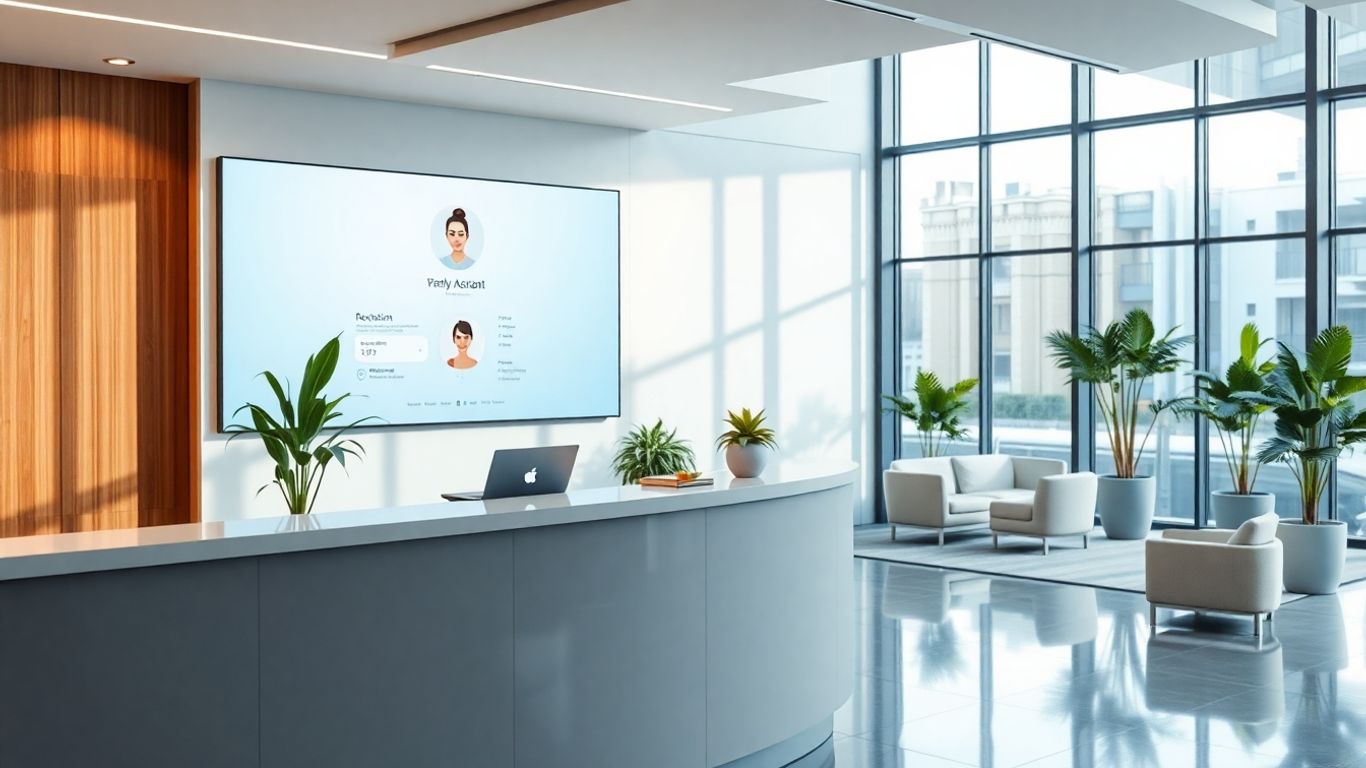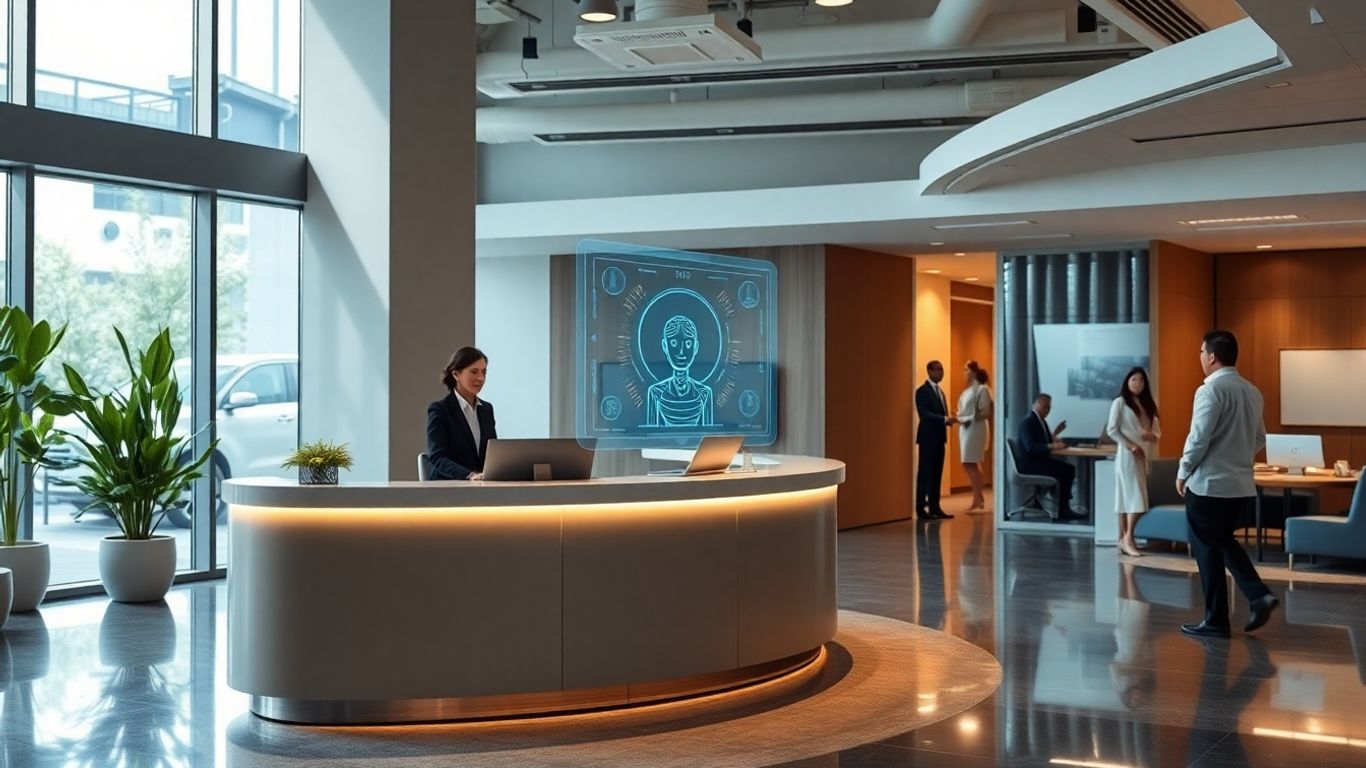Trying to keep up with business calls is tough, especially if you’re running a busy office or handling lots of customers. That’s where AI virtual receptionists come in. These tools don’t just answer phones—they can summarize calls, schedule appointments, and even handle questions after hours. If you’re searching for the best AI solution for virtual receptionist call summaries, you’ll want something reliable, easy to set up, and smart enough to understand real conversations. Here’s a look at 2025’s top picks and what makes them stand out.

My AI Front Desk stands out as a virtual receptionist built for modern businesses that need non-stop, smart customer service. This AI handles every single phone call, text, or web inquiry just like a real receptionist—no sleep required.
Here’s where it really makes a difference:
Some of the standout features include unlimited parallel calls (imagine every line at your business open at once!), voice cloning to match your brand’s tone, and easy setup that has you running in about five minutes. Customizable embeddable widgets and real control over when your AI is active just add to the flexibility.
Here’s a quick comparison of important day-to-day specs:
Some days, juggling multiple customer calls felt impossible, but once I set up My AI Front Desk, I honestly stopped worrying about missing leads or someone not getting the right answer. Now, I just check the summaries and everything’s handled.
It’s worth noting that setting up the virtual receptionist is seriously fast and connects with nearly every business platform you might use. If you need a reliable always-on solution, My AI Front Desk’s virtual receptionist is definitely one to put at the top of your list for 2025.
RingCentral is well-known for its virtual receptionist tools, helping businesses manage calls around the clock with a reliable, AI-powered system. This platform stands out in the virtual receptionist market because of its advanced call handling, excellent integrations, and ease of use—though you’ll want to pick the right plan to get the most helpful features.
Let’s break down what makes RingCentral a strong pick for call summaries and virtual receptionist duties:
For teams that handle a high volume of calls or want to streamline their business communications, RingCentral’s mix of smart call routing, AI summaries, and deep integrations helps keep everything neat and professional each day.
The only real drawbacks are that social media messaging isn’t natively supported (you’ll need to use workarounds), and the Core plan can feel limited—most growing businesses will want Advanced or Ultra. Still, for medium-to-large companies needing a reliable, flexible virtual receptionist, RingCentral is one of the safest choices in 2025.
Intercom is known for turning quick customer chats into clear, actionable summaries—a huge plus for busy businesses handling a flood of daily calls. This platform gives teams the tools to build chatbots and automate responses without diving into complicated code. With big customers like Atlassian, Amazon, and Meta, Intercom has proven it scales even when call and message volume spike.
Key features that stand out for virtual receptionist call summaries include:
Pricing for Intercom depends on your team size and how many unique conversations you have each month. Plans can work for startups or larger companies, but it's worth noting that advanced automation and deeper analytics come at higher tiers. Intercom also keeps releasing updates each year, so businesses using it tend to get access to new features and fixes quickly.
Intercom streamlines hectic workdays by ensuring every customer chat—whether by phone or online—gets logged and summarized automatically, so key info is always easy to find later.
While other tools focus on just call handling or scheduling, Intercom brings the power of smart summaries and ongoing improvements for customer interactions.
Cognigy stands out as a powerful AI platform for businesses looking to automate and summarize phone receptionist interactions. It’s designed with complex organizations in mind, letting you manage conversations across both voice and chat, while comfortably handling everything from appointment scheduling to detailed call summaries. What makes Cognigy unique is its ability to integrate deeply with your existing systems, ensuring information from calls flows directly into your CRM or ticketing platform without skipping a beat.
Some of the features that make Cognigy a popular pick for enterprise-level virtual receptionists include:
Here’s a quick look at how Cognigy stacks up for receptionist call summaries:
If your business juggles lots of inbound calls and needs reliable summaries sent to your CRM or team, Cognigy is built to handle the scale—no matter how many calls come in on a Monday morning.
Cognigy is best suited for larger operations or agencies that value robust automation and want a solution that’ll work around the clock. It’s in the same conversation as major players like AI-powered receptionist services, but stands out for its focus on deep system connections and detailed reporting. Pricing is customized, so you’ll need to reach out to Cognigy for a quote based on your needs.

Boost.ai has become a key name for companies searching for strong AI solutions for virtual receptionist call summaries in 2025. It stands out for its self-learning engine that quickly cuts down on setup and training time while delivering smart, context-aware responses. Many large organizations—especially in finance and government—pick Boost.ai for its performance and reliability across communication channels.
Key features of Boost.ai include:
Here’s a quick look at typical pricing and recognitions:
Businesses needing dependable and quick AI call summaries have found Boost.ai's reporting tools to be reliable and easy to use, without much learning curve.
For those wanting advanced features, such as 24/7 AI receptionist and phone integration, it’s worth comparing with other top names like My AI Front Desk, especially if you’re price sensitive or need rapid setup.

Birdeye stands out for small and medium businesses (SMBs) who want to centralize customer reviews, reputation management, and chat all in one spot. What makes Birdeye especially useful for virtual receptionist call summaries is its ability to capture insights from customer interactions across multiple channels and turn those into structured, readable summaries. It doesn't just manage calls—Birdeye pulls in customer feedback from web chats, SMS, phone, and online reviews, rolling everything into detailed dashboards.
Here’s what Birdeye brings to virtual receptionist needs:
A quick look at Birdeye’s call summary features:
Sometimes it feels like all our customer feedback finally has a home, and it actually leads to smarter business choices.
Some users love the convenience of seeing everything in one spot, the quick survey tools, and how Birdeye simplifies managing customer impressions. But, there’s the occasional complaint about support hiccups or old messages resurfacing in inboxes.
Birdeye earned top marks and over 200 badges in industry reputation reports, solidifying it as a serious contender if you need robust, AI-powered summaries and engagement tools for your front desk. For SMBs focused on growth and responsiveness, Birdeye is worth a look.
Drift has carved out a name for itself helping businesses streamline their communications using automated chat and smart AI tools. What sets Drift apart is how it balances automation with real-time human interaction, making customer communication both practical and more personal.
For businesses focused on sales and customer engagement, Drift's AI-driven chatbots can route leads, answer common questions, and summarize calls or chats with impressive clarity. Teams get a running start with ready-made templates, plus the flexibility to build custom bots tailored for different departments or products. Drift's conversational tools work with websites and messaging platforms, helping businesses start and nurture conversations that otherwise might have been missed.
Here are some practical features Drift users rely on:
Drift's pricing starts at $2,500 per year, which targets midsize and large businesses that want full-featured automation rather than basic messaging. A table below gives a quick sense of what Drift includes at its base pricing tier:
Automating the first touch with clients makes a huge difference to busy sales teams; Drift can save time, increase engagement, and help avoid leads slipping through the cracks.
For businesses interested in broader AI receptionist systems, exploring something highly customizable like My AI Front Desk appointment management could be a good next step.

Tidio has made a name for itself as a flexible AI customer service tool, with plenty of fans in the small business space. Its blend of live chat, AI bots, and virtual receptionist features makes it a solid choice for teams that want efficient call summaries and quick customer follow-up.
When you use Tidio, your virtual receptionist doesn't just answer calls—it can:
Here's a comparison of Tidio's main virtual receptionist features:
From my experience testing Tidio for a retail client, setup only took about ten minutes, and the call summary feature gave us useful notes after each customer inquiry. The workflow feels natural—like handing a notebook to an organized coworker who never forgets a detail.
For small businesses, Tidio's AI receptionist can be a time-saver—no more hunting for handwritten notes or trying to remember who called last Tuesday. It just keeps everything in one tidy place.
One thing to note: while the system is solid, power users might wish for even more integrations or custom summary fields. Still, for most companies that just want accurate, easy call logs and quick follow-ups, Tidio gets the job done without much hassle.
IBM watsonx Assistant is built to improve automated customer interactions, especially for businesses that handle high call volumes. What sets it apart is its ability to understand complicated queries and keep conversations natural, so callers feel heard rather than brushed aside. It isn’t just answering basic questions – it’s great for automating things like order processing, appointment scheduling, or helping customers track their journey, right from the phone.
Here's a quick breakdown of how IBM watsonx Assistant stands out for virtual receptionist call summaries:
For businesses, watsonx Assistant can mean fewer missed calls, faster answers, and way less time wasted on simple requests. You basically get a virtual receptionist that never gets tired, learns from every interaction, and keeps all your records tidy.
If budgeting is a concern, consider that AI-powered tools like My AI Front Desk deliver similar 24/7 experiences but with simple subscription pricing you can read about in their AI-driven customer support overview.
Google Dialogflow CX is Google’s advanced conversational AI platform, built specifically for companies that need virtual agents handling complex, branching conversations. It stands out for its easy visual flow editor, scalable architecture, and strong natural language understanding, making it popular for enterprise call summaries and virtual receptionist setups.
Dialogflow CX makes building and updating a smart virtual receptionist much less of a headache. Even if you’re not a seasoned developer, its flow editor and connected tools keep things manageable for growing businesses.
While it shines in model accuracy and context handling, operational complexity can crop up with very large deployments. Still, for anyone needing reliable call summaries tied to enterprise needs, Dialogflow CX is hard to beat in 2025.
Google Dialogflow CX makes it easy to build chatbots that understand what people say. It's great for helping users get answers fast. Want to try a smart phone receptionist yourself? Visit our website and see how Frontdesk can make your business calls easy and smooth.
Choosing the right AI solution for virtual receptionist call summaries in 2025 really comes down to what your business needs most. Some folks want something that just works out of the box, while others need deep integrations or advanced analytics. The good news is, there are plenty of options now—whether you’re a small shop looking for simple call handling or a bigger company needing detailed summaries and CRM sync. Most of these tools are quick to set up, and you can usually try them out before making a commitment. At the end of the day, the best pick is the one that saves you time, keeps your customers happy, and fits your workflow without a headache. If you’re still on the fence, start a free trial or book a demo—sometimes seeing it in action makes all the difference.
An AI virtual receptionist is a computer program that answers calls, helps customers, and takes messages for your business. It works 24/7 and can talk to people just like a real person.
The AI listens to the whole call and then writes a short summary. This summary tells you what the call was about, who called, and any important details you need to know.
No, setting up an AI receptionist is usually very easy. Most systems let you start in just a few minutes. You tell it about your business, choose your settings, and you’re ready to go.
Yes, you can teach the AI about your business. It can answer questions like your hours, services, or anything else you want. You just add this information to its system.
Yes, AI receptionists work all day and night. They can answer calls, schedule appointments, and help customers even when your office is closed.
Many services let you try their AI receptionist for free for a short time, like 7 days. This way, you can see if it works for your business before you buy it.
Most AI receptionists can connect with other apps, like your calendar or customer management tools. This helps keep all your information in one place and saves you time.
Yes, top AI receptionist services use strong security to protect your calls and data. Always check that the service has good reviews and takes privacy seriously.
Start your free trial for My AI Front Desk today, it takes minutes to setup!








